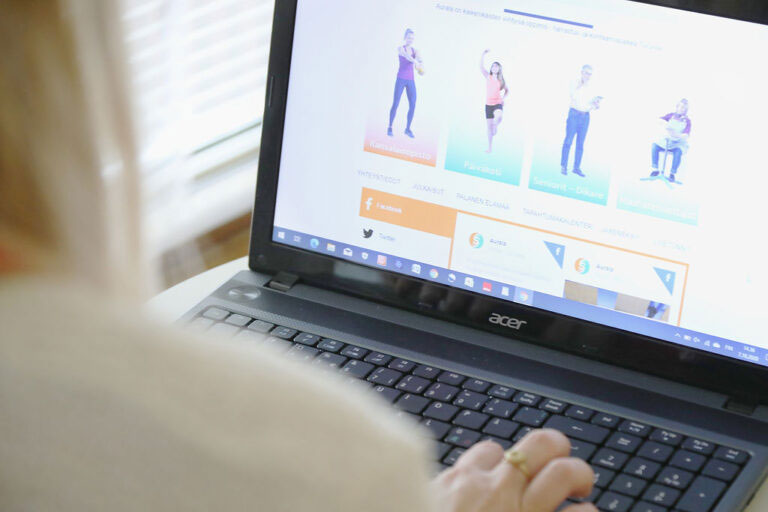
What will the workplace of the future be like in the 2030s? What kind of competence is needed and how is it accumulated? How is work done? Answers to these questions were sought in the future of work forecasting workshop. The participants in the workshop represented students from different fields of study of TUO, the student union of the university of applied sciences. Fifteen young people discussed with the teaching and guidance staff the contents of future working life and the social phenomena and forces of change affecting it. The event was organized just before the start of the corona pandemic, but the results obtained from the workshop have become even more relevant compared to last year. 2020 at the beginning of the workshop.
In small group work, e.g. Competence card pack prepared by the National Board of Education's foresight forum ( Ennakointutuloksi | Opetushallitus (oph.fi)) and regional foresight material produced by Varsinais-Suomen Ennakointiakatemia ( https://ennakointiakatemia.fi/ ). The contents of the future working life were considered from different perspectives, such as skill development, industry, environment and ecology, digitalization and robotics, business and value chains and services and from the perspectives of community.
The students highlighted the importance of lifelong learning: self-direction and the change of expertise were considered important and strengthening phenomena in the working life of the future. The discussions emphasized the importance of leadership. Organizations must be flexible and contribute to motivating personnel for lifelong learning and, on the other hand, enable models for reconciling work, leisure and family life. Future learning environments were perceived to be very diverse. The blurring of work and free time was felt to be even stronger. At the same time, the young people felt that free time was very important in terms of their own future. The versatile utilization of digitization and robotization were seen as important phenomena in workplaces in various fields. The young people experienced remote services, knowledge work and versatile use of information in different professions as significant things in the future working life. The possibilities of utilizing the platform economy were also defined as a change factor, which is already commonplace in certain sectors. Environmental issues were also discussed in small groups, and the young people clearly pointed out that responsible production in both services and industry, ecology and the principles of sustainable development will be further strengthened in all sectors in the 2030s.
In the latter part of the small group work, the future competence card pack prepared by the Norwegian Board of Education's Foresight Forum was used. In the group work, it was brought up that the cards of the competence card deck describe general meta-level competences that cross different professions and areas of competence. Versatile digital skills were strongly highlighted in the competence cards of different fields, but for example interaction and multicultural oral skills were less prominent in these cards, even though the young people themselves defined them as important skills for the future.
What did we learn from the workshop - what does working life look like in the 2030s from the point of view of today's young Finns? There is a constant change going on in working life, which can be seen, for example, in the emphasis on flexibility and the enhancement of work task processes, in the preference for low-hierarchy pop-up teams, in the grouping of work, in the emphasis on internal motivation and autonomy as the core model for performing tasks, and in the pursuit of continuous evaluation and learning. In the competence requirements, for example, flexible and effective work with other people, continuous learning, the ability to visualize and anticipate wholes, multicultural competence and the ability to coordinate teams without forgetting versatile digital skills are emphasized more and more strongly. At the same time, artificial intelligence is increasingly linked to new services, means of transportation and production processes, increasing the performance of individual people and teams and reducing routine tasks and previously hidden duplications. Robots as co-workers are commonplace at workplaces in various fields. The environmental aspect has been taken into account more concretely in different ways both in industry and in service sectors.
How can giving a workshop mirror the activities and development work of Aurala's civic college and other colleges? Civic colleges support the realization of the principles of continuous learning in society and enable the development of individuals' skills at different stages of the life cycle through a versatile range of courses. Civic colleges offer a wide variety of studies that can be used in working life (e.g. civic skills, multiculturalism, languages, digital skills) - these types of working life skills that cross different professions and fields of expertise are important now, but their importance will grow even more in the future.
A development process is underway at civic colleges, which makes it possible for the student to receive an evaluation and credits from the civic college course in the future. It will be possible to get an evaluation and credits from autumn 2021 in some courses, if the student so wishes. In the OSKU development project that started in the spring of 2021 (in addition to the Aurala civic college, the implementers are other actual Finnish civic colleges) we will delve deeper into developing the competence-based nature of civic colleges and how e.g. the knowledge gained through studies can be genuinely utilized both in working life and more broadly in the daily life of the student/individual and as part of his lifelong learning process.
Responding to the competence requirements of the future working life and the principles of lifelong learning requires the active cooperation of the region's various educational organizations and liberal arts operators now and in the future. Each organization produces competence-based study and course offerings, taking into account the needs of different student/learner groups.
Author: Elina Vuorio, Turku University of Applied Sciences, project expert and project manager
Photo: Hilja Mustonen

